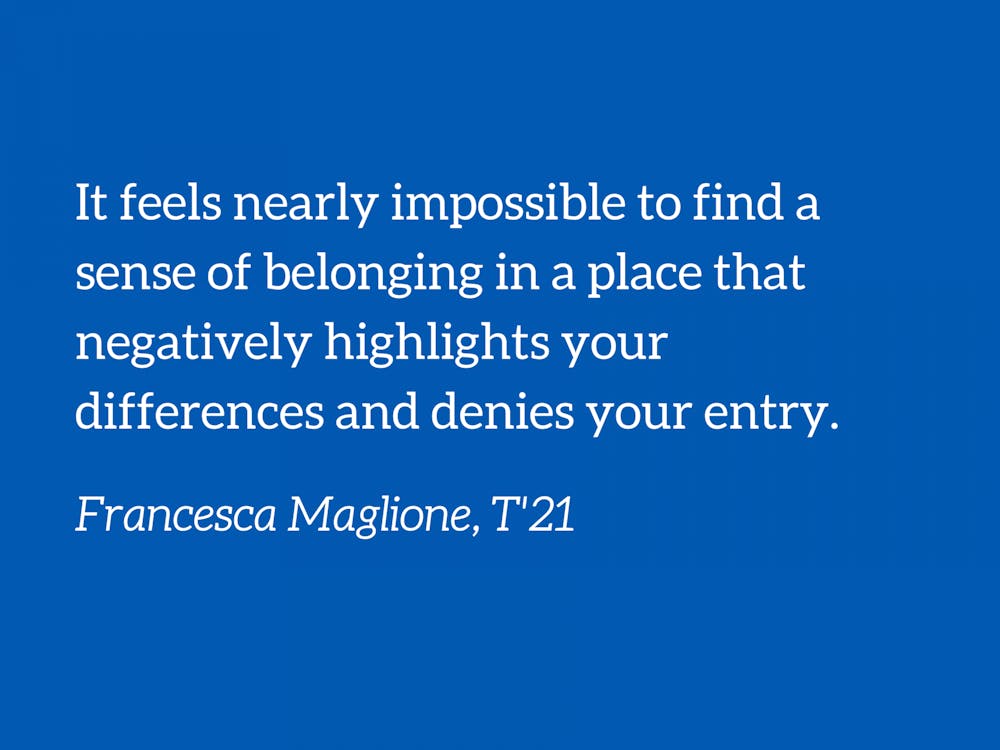I’m an international student at Duke University. I grew up in the Dominican Republic but unlike my international friends, I have the privilege—that’s been highlighted this week—of having an American passport. When I got to Duke, I started to build my own world where I belonged. This wasn't, and still is not, always easy.
There are times at Duke when others disregard what I’m saying completely and just pay attention to how I say it, times when I feel like my ideas become background noise in a conversation, and times when I feel like a complete outcast when I’m not familiar with something that is so obviously American. But I can confidently say that I have found a group of people that make Duke feel like home. Some of those people, coincidentally, are international students with different passports. But regardless of where we come from, my friends and I share the same tireless work ethic that got us to Duke and that allows us all to remain there as equals. Or at least so we thought.
On Monday July 7th, the Immigration and Customs Enforcement Office stated that any international student enrolled in an institution operating fully online may not remain in the United States to complete their studies. International students attending a hybrid institution, such as Duke, must enroll in at least one in-person class. After reading this statement, I, alongside many other international students, had a lot of questions. The preexisting uncertainty felt by my international friends as they thought about their return to the United States has now been exacerbated and accompanied by thousands of hypotheticals surrounding this change:
If my university decides to go online mid-semester does that mean I have to leave the country immediately? Will I even be able to go home? What if there is a travel-ban? What will happen to the many relationships I’ve built in the United States? Will I risk infecting my family at home? How does this affect my job opportunities? Will I even get to come back into the United States?
Take my Argentinean cousin, Tobias, for example. He is a student-athlete at Camden County College. His fall semester has been transferred online. Argentina is completely closed, and his American visa is being threatened. Where does he go? What does this mean for him? Over the last few days I’ve been listening to different iterations of the same struggle—international students feeling angry, lost, and in Tobias’ case, with nowhere to go.
Not only is the uncertainty a mental burden for international students, but not having the option to return to school in the fall can result in a complex web of struggles. Some students rely on the comfort of on-campus facilities to perform academically, while others don’t have the materials or space to work effectively in their home environments. Not to mention students that live in different time zones, that had to wake up at outrageous hours to attend their Zoom classes when the Covid-19 outbreak first started. For many, attending a university in the United States is a measure of their drive and dedication towards their education. The benefits of this education expand beyond the classroom, manifesting into liberties that they may not find in the confines of their home countries. This policy alienates international students and threatens their academic and professional careers.
Furthermore, ICE’s new policy forces students to decide between their health and their education. An international student within the hybrid system is forced to take at least one in-person class, even if it means that taking the same class online could reduce their exposure to Covid-19. This change is undermining the university's ability to make informed decisions about what mode of instruction is best for all their students amidst a global pandemic.
It places an immense amount of pressure on universities to hold in-person classes, in order to maintain their international community, while disregarding public health concerns. Does this mean international students have to gamble between health and education? Why is the US government so quick to mandate unjust policies that target internationals in the name of halting the spread of the coronavirus, all while their own citizens cannot even seem to wear a mask?
According to the U.S Department of Commerce, international students contribute $44 billion a year to the U.S economy. NAFSA stated that international students create more than 458,000 jobs in the United States. This new policy expects international students to pay for tuition just like any other student, but not have the opportunity to experience any of the benefits that being on campus can bring—they are placed on an unequal playing field.
I feel the struggles of my fellow international students. It feels nearly impossible to find a sense of belonging in a place that negatively highlights your differences and denies your entry. The contributions international students make towards Duke’s community bring culture and perspective that would not exist otherwise. For some students, Duke has become a home and refuge. For those who are graduating, it’s their last year to experience life at their universities. They've invested endless hours of work and stress, making them just as deserving as any other member of Duke’s student body. They too should be allowed to choose how they spend their last semesters. To all of the international students that are scared and confused about what this year will bring—I hope the coming weeks are full of encouraging answers, change, and clear support from our institutions. Duke is not Duke without its international population.
Francesca Maglione is a Trinity senior.
Get The Chronicle straight to your inbox
Sign up for our weekly newsletter. Cancel at any time.

